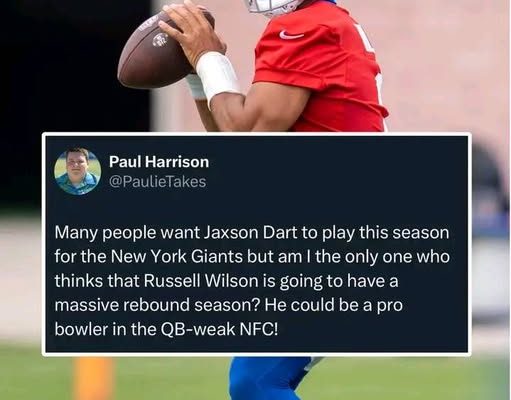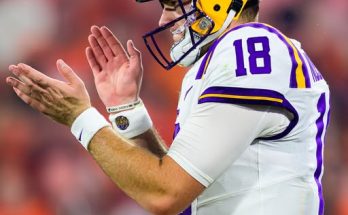Russell Wilson’s journey through the NFL has been nothing short of cinematic. From his underdog rise with the Seattle Seahawks to a sudden fall from grace in Denver, the arc of his career seemed to have hit a sharp decline. But as is often the case in sports—and life—resilience often defines greatness more than success does. Now, with a new opportunity looming in one of the league’s most scrutinized markets, Wilson’s move to the New York Giants may be exactly what he needs to rewrite the narrative surrounding his career. It is a storyline rich with intrigue, doubt, and the potential for redemption. If approached correctly, this could mark the most critical and transformative chapter of his football life.
Russell Wilson’s time with the Denver Broncos was marred by dysfunction and unmet expectations. After being traded to Denver in 2022 and signing a massive five-year, \$245 million contract extension, the anticipation was that Wilson would return the Broncos to the glory days last seen with Peyton Manning. Instead, the result was a series of misfires—on and off the field. Wilson looked visibly slower, his decision-making more erratic, and the chemistry with his teammates seemingly fractured. Head coach Nathaniel Hackett was fired before completing even a full season, and despite modest improvements under Sean Payton in the following year, the damage to Wilson’s reputation was substantial. Many began to question whether he had peaked in Seattle and was now on a slow, irreversible decline.
That narrative, however, fails to consider the deeper context behind Wilson’s struggles. The offensive line in Denver was porous, often leaving Wilson scrambling for safety rather than executing designed plays. The play-calling lacked the creativity that had helped him flourish in Seattle. The Broncos offense didn’t seem tailored to his strengths—play-action passes, deep throws off bootlegs, and a mobile scheme that allows him to extend plays. Instead, he was often forced into quick reads behind a collapsing pocket. This kind of situation is punishing for any quarterback, let alone one trying to adapt to a new system and prove his worth under a microscope.
The New York Giants represent both a challenge and an opportunity. It’s a market that thrives on storylines, demands accountability, and rewards winners like no other. For Wilson, a man who has always thrived under pressure and displayed an almost presidential level of poise, the Big Apple might be just the right environment to stage a career revival. Unlike Denver, where the weight of expectation was immediate and suffocating, the Giants offer a slightly different dynamic. Yes, expectations are high, but the team is in transition. There is room for Wilson to grow with the organization, especially under a coaching staff that seems better prepared to adapt to his skillset.
Head coach Brian Daboll is a critical figure in this equation. Daboll, best known for his work with Josh Allen in Buffalo, has a knack for maximizing quarterback potential. He’s creative, understands the modern dynamics of NFL offenses, and is not afraid to evolve his playbook based on the strengths of his personnel. In Allen, Daboll took a raw, physically gifted but inconsistent quarterback and turned him into an MVP-caliber player. With Wilson, he’s not working with a raw talent but rather a seasoned veteran with a Super Bowl ring and multiple Pro Bowl appearances. The task now is rebuilding confidence, simplifying the offense, and re-establishing Wilson as a dual-threat quarterback who can still hurt teams both in the air and on the ground.
One major difference between Wilson’s arrival in New York and his time in Denver is the tone of the narrative. In Denver, Wilson was expected to be the final piece of a Super Bowl puzzle. In New York, he’s more of a reclamation project, and that changes the stakes entirely. The pressure is still immense—it’s New York after all—but the lens is slightly more forgiving, at least at the outset. If he plays well, he’s a comeback story. If he falters, well, the Giants are still seen as a team in rebuild mode, especially after inconsistency at the quarterback position in recent years. That slight reframing could give Wilson the breathing room he desperately needs.
Wilson’s motivation cannot be overlooked either. Athletes of his caliber don’t just walk away quietly. This is a player who was once mentioned in the same breath as Patrick Mahomes and Aaron Rodgers. He was known for his miraculous escapes, deep-ball accuracy, and late-game heroics. He led his team to two Super Bowl appearances, winning one. His fall from grace in Denver has to sting. Critics questioned not just his game, but his leadership, his personality, and even his locker room presence. If history is any guide, Wilson has likely internalized all of that and is now burning with the desire to prove those critics wrong. A chip on his shoulder might be exactly what propels him back to greatness.
One of the most compelling aspects of this move is the impact it may have on the Giants’ overall team identity. New York has long been in search of a quarterback who can be both a leader and a playmaker. Daniel Jones showed flashes but has not proven to be the consistent franchise quarterback the Giants hoped for. Injuries, turnovers, and lack of development have plagued his tenure. Enter Wilson, who—even in his down years—has shown he can win games, manage late-game scenarios, and bring a veteran presence to the locker room. His championship experience alone elevates the standard within the building. Younger players will naturally gravitate toward someone who has hoisted the Lombardi Trophy.
Additionally, the Giants’ offensive weapons may suit Wilson better than what he had in Denver. The emergence of young receivers, a healthy Saquon Barkley in the backfield (if retained or replaced adequately), and a coaching staff willing to build around Wilson’s strengths sets a more promising stage. The key will be building an offensive line that can keep him upright. At this point in his career, Wilson’s legs are still an asset, but he no longer has the same elite escapability that defined his early years. Protection, timing, and scheme will matter more than ever.
Wilson’s revival also holds significant implications for the broader NFL. The league is always in search of redemption stories—it’s a cornerstone of its narrative framework. From Peyton Manning’s Super Bowl win after being written off by the Colts to Geno Smith’s unlikely resurgence with the Seahawks, the NFL has a long history of quarterbacks who reemerge when given the right opportunity. Wilson’s situation mirrors those arcs in many ways. He’s got the pedigree, the desire, and now, perhaps, the right situation.
Critics may still doubt his arm strength, his decision-making under pressure, or his ability to lead a team of younger players in a new environment. But those doubts only serve to deepen the intrigue. Wilson has always carried himself with unwavering belief. That confidence, sometimes mistaken for arrogance, has fueled his rise from a third-round pick to a face of the league. Now, it will be tested like never before.
Moreover, Wilson’s presence in New York also elevates the NFC East. A division already featuring the Eagles, Cowboys, and Commanders suddenly gets another injection of quarterback drama. Rivalries will intensify. Prime-time games will be more frequent. The Giants, long perceived as an afterthought in recent years, suddenly become relevant again. If Wilson succeeds, he won’t just revive his own career—he’ll help rejuvenate a franchise and a fan base that has been starved for consistent quarterback play since Eli Manning’s twilight years.
The journey ahead won’t be easy. The New York media is notoriously unforgiving. A bad game can snowball into a crisis. But Wilson has always thrived when the odds are stacked against him. Whether it was proving doubters wrong about his height, or overcoming roster limitations in Seattle, Wilson has shown an ability to rise above adversity. That trait will serve him well in New York. If he can tune out the noise and stay focused on execution, there’s no reason he can’t play at a Pro Bowl level once again.
There is also the matter of legacy. Few players get to control the final chapters of their career. Many are traded, released, or fade into irrelevance. But Wilson, still only in his mid-30s, has a real chance to dictate how he is remembered. A successful tenure with the Giants could alter the perception of his entire career. It would remind fans and analysts alike that his greatness wasn’t a product of Pete Carroll’s defense or Marshawn Lynch’s bruising runs. It was real, earned, and still present.
In many ways, this moment mirrors the crossroads faced by other greats who had to reinvent themselves late in their careers. Tom Brady left New England to prove he could win without Bill Belichick—and he did. Matthew Stafford finally got out of Detroit and won a Super Bowl with the Rams. Even Joe Montana found late-career relevance with the Kansas City Chiefs. Wilson’s opportunity with the Giants fits that mold. It’s not about reclaiming MVP status. It’s about proving he can still lead, inspire, and most importantly—win.
There will be doubters at every turn. That comes with the territory in New York and with any athlete attempting to stage a comeback. But Wilson has built a career on moments that defy expectation. From his walk-on days in college to being drafted lower than he should have been, from early-career heroics to Denver’s disappointment—his story has always been one of overcoming. That spirit is not easily extinguished.
If he embraces this opportunity with humility, hard work, and the same unwavering self-belief that got him this far, the story of Russell Wilson won’t be one of decline. It will be one of revival. A tale of a veteran quarterback finding himself once more under the bright lights of New York. And if he succeeds, it won’t just be a win for the Giants—it’ll be a reminder that greatness can falter, stumble, and still rise again.



